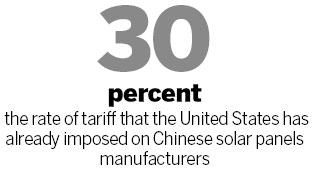China reassured about EU-US trade pact
EU trade chief: Deal could increase each side's GDP by half of 1 percentage point each year
China has "no reason" to worry about an ambitious free-trade pact being negotiated by the United States and the European Union, because the two are already its biggest trading partners, the EU's trade chief said.
Trade Commissioner Karel De Gucht was asked after a talk in New York on Tuesday about the proposed Transatlantic Trade and Investment Partnership, or TTIP, if the US and EU recognize that the scope of the pact - representing as much as a third of global trade - might make Chinese leaders nervous.

Repeating a statement in January from US President Barack Obama, De Gucht said the pact could "level the playing field in the growing markets of Asia". But he added that China should follow the lead of the US and the EU by opening up its market further to help revive stalled global trade talks.
De Gucht, a former Belgian deputy prime minister, said at the Council on Foreign Relations that China has become a "very important economy" and has "to take up global responsibility."
The result "will never be ideal, but they have also the same kind of duty that we have", he said of China and the West.
EU and US leaders announced in February their decision to work toward the trade pact, and negotiations are set to begin this summer. The two sides say reducing barriers to trade and investment through the agreement would spur growth and create jobs, helping the US to emerge from slow growth and the EU from recession.
De Gucht cited EU data showing the trade agreement could increase each side's GDP by as much as half of 1 percentage point annually in the short term.
Although the proposed pact appears to concern only the EU and the US, it also has implications for China and other emerging Asian economies.
Jose Manuel Durao Barroso, the president of the European Commission, the EU's executive body, has said the TTIP isn't only about economic gains but could serve a larger strategic purpose to "rebalance" the US toward Europe after Washington's much-publicized "pivot" to Asia.
US and EU officials have said the trade agreement will help ensure that Americans and Europeans set standards on product safety and intellectual-property protection in years to come.
De Gucht has been quoted as saying that unless Washington and Brussels agree on policies, in too many future trade cases, "we would be forced to accept Chinese standards".
On Monday, the New York Times reported that the Obama administration and the EU had decided to negotiate settlements with China over its alleged dumping of low-priced solar panels.
That plan would carve up the global solar panel market into regional chunks, the newspaper reported. If enacted, it could sharply increase prices of panels imported from China, the world's dominant producer, by requiring Chinese companies to charge more while limiting the total number of panels they ship.
When asked on Tuesday to comment on the report, De Gucht said no decision has been reached regarding solar panels.
In a separate speech at the European American Chamber of Commerce in New York, the EU's trade chief said there were no coordinated talks between the EU and the US over Chinese solar panels.
"We do not have a common battle plan. We have not discussed it," De Gucht was quoted as saying by Reuters. "We have not teamed up. We have not done so."
The EU has until June 5 to decide whether to impose anti-dumping and countervailing duties averaging 47 percent on Chinese-made solar panels. The US has already imposed duties of about 30 percent against Chinese manufacturers.
In his speech at the Council on Foreign Relations, De Gucht pointed out that the most recent negotiations at the World Trade Organization - known as the Doha round - have been suspended since 2011. The "shifting balance of the global economy", he said, means that emerging economies "now have increased responsibility for the well-being of the overall system".
"Ensuring that negotiations move forward is part of that responsibility," he said.
Just as the EU and the US have advanced global trade in the past by expanding access to their markets, "this responsibility now falls on emerging countries, too - particularly in many economic areas where companies are global competitors", De Gucht said.
He blamed a "divergence of views about the different contribution needed from different players" for the WTO talks getting bogged down.
A "new global covenant" on trade that recommits members of the global trade body to principles of open markets is needed, he said.





















